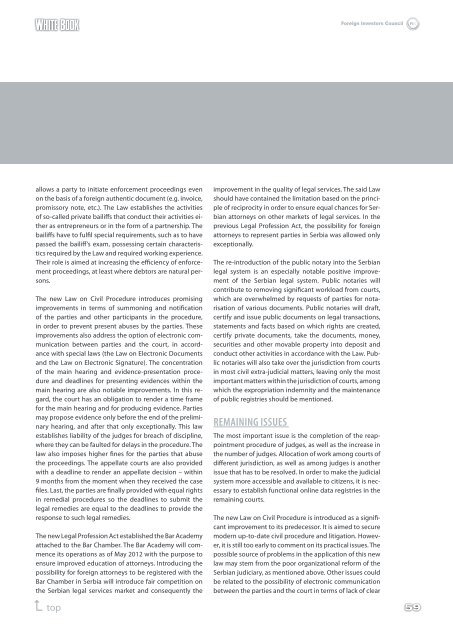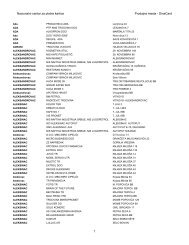Fic rEcommEndationS - Eurobank EFG
Fic rEcommEndationS - Eurobank EFG
Fic rEcommEndationS - Eurobank EFG
Create successful ePaper yourself
Turn your PDF publications into a flip-book with our unique Google optimized e-Paper software.
allows a party to initiate enforcement proceedings even<br />
on the basis of a foreign authentic document (e.g. invoice,<br />
promissory note, etc.). The Law establishes the activities<br />
of so-called private bailiffs that conduct their activities either<br />
as entrepreneurs or in the form of a partnership. The<br />
bailiffs have to fulfil special requirements, such as to have<br />
passed the bailiff’s exam, possessing certain characteristics<br />
required by the Law and required working experience.<br />
Their role is aimed at increasing the efficiency of enforcement<br />
proceedings, at least where debtors are natural persons.<br />
The new Law on Civil Procedure introduces promising<br />
improvements in terms of summoning and notification<br />
of the parties and other participants in the procedure,<br />
in order to prevent present abuses by the parties. These<br />
improvements also address the option of electronic communication<br />
between parties and the court, in accordance<br />
with special laws (the Law on Electronic Documents<br />
and the Law on Electronic Signature). The concentration<br />
of the main hearing and evidence-presentation procedure<br />
and deadlines for presenting evidences within the<br />
main hearing are also notable improvements. In this regard,<br />
the court has an obligation to render a time frame<br />
for the main hearing and for producing evidence. Parties<br />
may propose evidence only before the end of the preliminary<br />
hearing, and after that only exceptionally. This law<br />
establishes liability of the judges for breach of discipline,<br />
where they can be faulted for delays in the procedure. The<br />
law also imposes higher fines for the parties that abuse<br />
the proceedings. The appellate courts are also provided<br />
with a deadline to render an appellate decision – within<br />
9 months from the moment when they received the case<br />
files. Last, the parties are finally provided with equal rights<br />
in remedial procedures so the deadlines to submit the<br />
legal remedies are equal to the deadlines to provide the<br />
response to such legal remedies.<br />
The new Legal Profession Act established the Bar Academy<br />
attached to the Bar Chamber. The Bar Academy will commence<br />
its operations as of May 2012 with the purpose to<br />
ensure improved education of attorneys. Introducing the<br />
possibility for foreign attorneys to be registered with the<br />
Bar Chamber in Serbia will introduce fair competition on<br />
the Serbian legal services market and consequently the<br />
� top<br />
improvement in the quality of legal services. The said Law<br />
should have contained the limitation based on the principle<br />
of reciprocity in order to ensure equal chances for Serbian<br />
attorneys on other markets of legal services. In the<br />
previous Legal Profession Act, the possibility for foreign<br />
attorneys to represent parties in Serbia was allowed only<br />
exceptionally.<br />
The re-introduction of the public notary into the Serbian<br />
legal system is an especially notable positive improvement<br />
of the Serbian legal system. Public notaries will<br />
contribute to removing significant workload from courts,<br />
which are overwhelmed by requests of parties for notarisation<br />
of various documents. Public notaries will draft,<br />
certify and issue public documents on legal transactions,<br />
statements and facts based on which rights are created,<br />
certify private documents, take the documents, money,<br />
securities and other movable property into deposit and<br />
conduct other activities in accordance with the Law. Public<br />
notaries will also take over the jurisdiction from courts<br />
in most civil extra-judicial matters, leaving only the most<br />
important matters within the jurisdiction of courts, among<br />
which the expropriation indemnity and the maintenance<br />
of public registries should be mentioned.<br />
rEmaininG iSSUES<br />
The most important issue is the completion of the reappointment<br />
procedure of judges, as well as the increase in<br />
the number of judges. Allocation of work among courts of<br />
different jurisdiction, as well as among judges is another<br />
issue that has to be resolved. In order to make the judicial<br />
system more accessible and available to citizens, it is necessary<br />
to establish functional online data registries in the<br />
remaining courts.<br />
The new Law on Civil Procedure is introduced as a significant<br />
improvement to its predecessor. It is aimed to secure<br />
modern up-to-date civil procedure and litigation. However,<br />
it is still too early to comment on its practical issues. The<br />
possible source of problems in the application of this new<br />
law may stem from the poor organizational reform of the<br />
Serbian judiciary, as mentioned above. Other issues could<br />
be related to the possibility of electronic communication<br />
between the parties and the court in terms of lack of clear<br />
59




